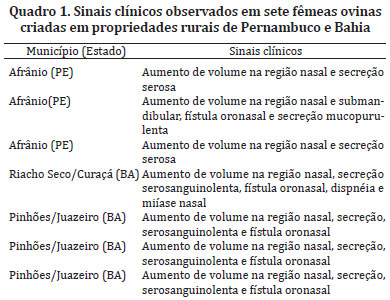Pythiosis is a devastating infectious disease caused by an aquatic oomycete, Pythium insidioum, and affects animals and humans that inhabit wetlands. The disease is characterized mainly by granulomatous lesions in the hosts. The purpose of this study was to report the occurrence of pythiosis in sheep in the states of Pernambuco (PE) and Bahia (BA), Northeastern Brazil, as well as to evaluate the efficacy of an immunotherapic against ovine pythiosis. Blood samples were collected from 53 sheep, 49 from flocks in counties located in PE and four from BA. Seven sheep showed clinical signs of ovine pythiosis; one of them was submitted to euthanasia and its head and submandibular lymph node was collected and sent for histopathologic and mycological analyses. Other six sheep were treated with an immunotherapic. During the treatment the animals were kept in the Sheep Industry Sector facilities at Univasf/Petrolina-PE. ELISA, fungal culture and polymerase chain reaction (PCR) methods were used to confirm the diagnosis of clinical ovine pythiosis in the sheep flock. At microscopic examination of the material collected from the nasal cavity of a sheep euthanized was observed a focally extensive area of necrosis with presence of diffuse infiltration of intact and degenerated neutrophils bordering the cartilage. Only one sheep showed clinical cure, indicating efficiency in the pythiosis treatment of 16.7% (1/6). Ovine pythiosis has been increasing in several municipalities of PE and BA. In this context, the immunotherapy may be an alternative to be searched. Therefore, further studies are needed to investigate the effect of immunotherapy on ovine pythiosis.
Pythiosis; ELISA; PCR; immunotherapy; sheep






